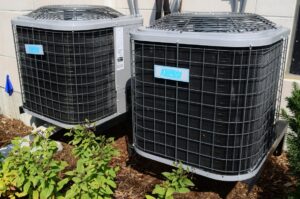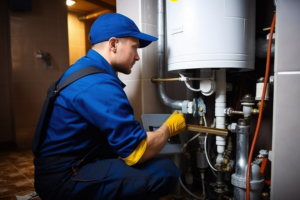Cooling a home down using the power of a geothermal heat pump is one of the most reliable and energy-saving methods of air conditioning. The U.S. Department of Energy estimates that geothermal heat pumps work three to four times more efficiently than standard air-source heat pumps. They also have extraordinary longevity: the indoor heat pump components can last 20 years, and the in-ground coils can last more than 50. Geothermal power also produces few emissions, making it a good idea for the environment as well.
But how does geothermal power cool down a home? We’ll explain the surprisingly simple way that a geothermal heat pump delivers you cooling as powerful as any standard air conditioner.
If you’re eager to get started with geothermal cooling in New Haven, CT, contact our technicians at Celco Heating and Air Conditioning. We have helped customers year-round since 1976.
How geothermal cooling operates
The basic principle behind geothermal cooling is heat exchange, which is also the principle behind air conditioners and air-source heat pumps. Geothermal home comfort systems are types of heat pumps: they move heat from one location and deposit it in another. However, the standard heat pump uses the air as the medium for its heat exchange. During hot weather, the heat pump removes heat from the indoor air and puts it in the outdoor air, lowering the indoor temperature. During cold weather, it reverses the process.
A geothermal heat pump, however, is a ground-source heat pump: it uses the earth’s warmth for half of the heat exchange process. During the summer, the indoor unit absorbs heat through evaporation, just like an air conditioner does. But it moves the heat through water-filled coils down into the ground and deposits it there. The ground coils are buried 10 feet or deeper beneath the surface, where the temperature stabilizes around 55°F. The stable temperature is how geothermal heat pumps achieve their high efficiency; they do not have to worry about temperature fluctuations in the air that can make it harder to carry out heat exchange. This is especially important during the winter, when the heat pump switches from cooling mode to heating mode; the low temperatures of a Connecticut winter have no effect on a ground-source heat pump, because the underground temperature remains the same.
Professional Geothermal Installation
The work required to install a geothermal heat pump is intensive and time-consuming. You should only entrust it to professional installers who will make the work go as smoothly and quickly as possible. For quality installation of geothermal cooling, turn to Celco Heating and Air Conditioning. Our team has years of experience in providing HVAC installation services for residential and commercial clients across Darien, Fairfield, Milford, Monroe, Norwalk, Shelton, Stamford, Stratford, Trumbull, Westport, CT and the nearby communities.
If you believe your existing geothermal heat pump may just need a little TLC, we’ve got you covered. Our team has all of the proper knowledge and tools to handle HVAC maintenance and repairs. Whether you’re noticing the signs of a problem, ready to switch to a geothermal heat pump, or need a replacement, rely on us for quality and prompt service for any and all of your heating and cooling needs. To learn more about geothermal heat pumps or to schedule an appointment, contact a member of our team today!






